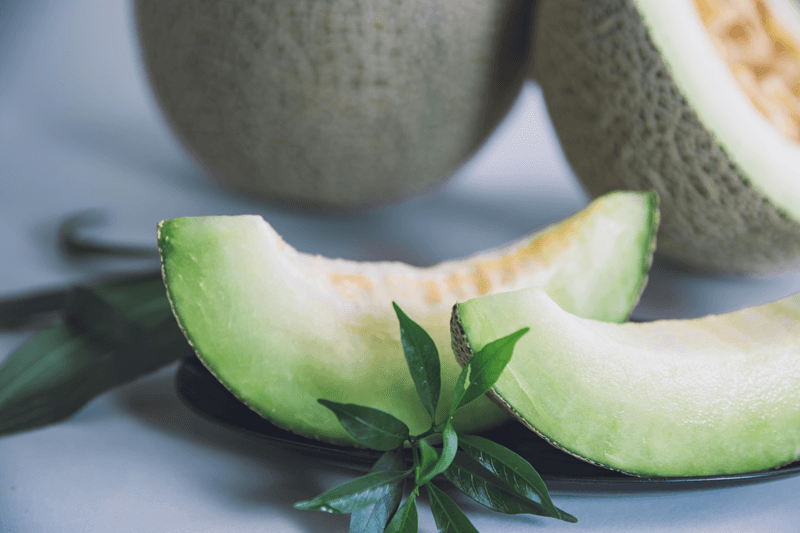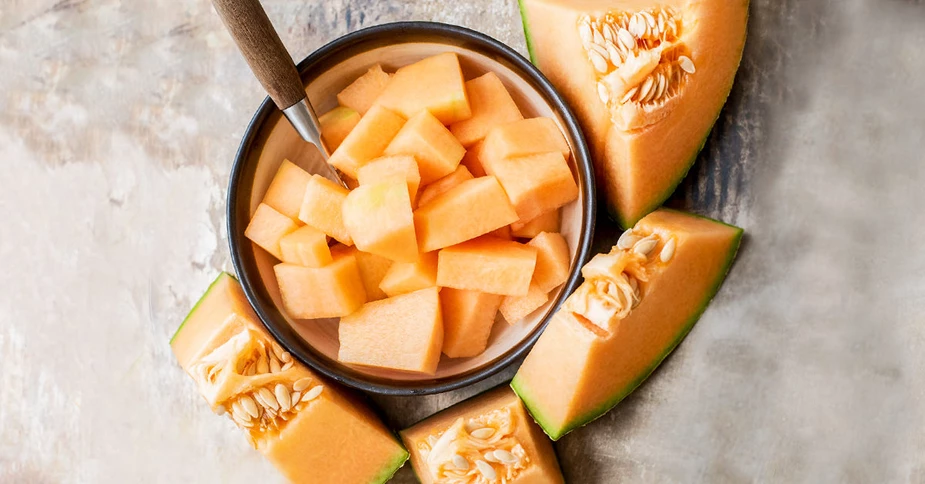High water content and many vitamins such as A and C, minerals and antioxidants found in cantaloupe help prevent dehydration, preventing cell damage that leads to cancer and other human health conditions.

Macular degeneration is the leading cause of vision loss in people aged 60 years and older. This is a condition in which the eye loses the ability to see details in the center of vision, causing the surrounding world to become blurred, distorted and deformed. Although it does not cause pain or complete blindness for the patient, it will create many effects in daily life.
Lutein and zeaxanthin are two types of carotenoids Importantly, they are pigments produced by plants, giving vegetables and fruits their yellow to slightly red color. When working together, they help eliminate harmful blue light rays, thereby helping to protect eye health as well as prevent damage that leads to age-related macular degeneration.
2. ASTHMA
Based on animal studies, when consumed in High in antioxidants like beta carotene, a form of vitamin A that will help prevent asthma. Beta carotene is found in yellow and orange fruits, such as cantaloupe.
According to some experts, vitamin C is a vitamin and a substance Antioxidants are extremely essential for the treatment of asthma. One cup of cantaloupe (177g) provides 65mg of Vitamin C, and according to recommendations for adults, women need to supplement 65-75mg of potassium while men need 75-90mg of potassium per day.
In addition, in a 2010 study, People with asthma are encouraged to consume choline – another antioxidant found in cantaloupe to reduce the level of inflammation of the disease.
3. BLOOD PRESSURE
Fiber, potassium, vitamin C and choline are found in cantaloupe Supports cardiovascular health. Consuming foods rich in potassium helps lower blood pressure, can prevent the risk of stroke, the formation of kidney stones as well as prevent loss of muscle mass and bone mineral density.
The American Heart Association (AHA) recommends that 1 Adults need to consume 4,700mg of potassium per day to keep the cardiovascular system healthy.
One cup of cantaloupe (177g) provides approximately 473mg of potassium, equivalent to 10% of a person’s recommended daily intake.
4. CANCER
Thanks to beta carotene, tocopherol and other substances Other antioxidants in cantaloupe can help prevent cell damage caused by oxidative stress. There is evidence that supplementing these and other antioxidants reduces the risk of lung, colon, prostate and other cancers.
One cup of cantaloupe (177g) contains 1.6g of fiber and this is also a substance that has the ability to protect against colorectal cancer.
5. DIGESTIVE
Soluble fiber and insoluble fiber found in cantaloupe works to support intestinal health, helps prevent constipation and maintain a healthy digestive tract. Having a healthy digestive tract contributes to preventing conditions such as appendicitis and irritable bowel syndrome.
6. SKIN AND HAIR
You can find vitamin A among the ingredients of many products. facial care products. Many studies have proven that antioxidants help improve sun-damaged skin as well as restore, moisturize and stabilize skin collagen.
Vitamin A contributes to the development and maintenance of all body tissues, including those in the skin and hair. Vitamin C helps the body produce collagen to restructure human cells, skin and hair. A 2019 review pointed to a range of minerals and vitamins that may play a role in promoting hair growth as well as preventing hair loss.
Cantaloupe is one of many foods rich in vitamin A and C. Because vitamin A is a fat-soluble vitamin, cantaloupe is often eaten with healthy fats such as olive oil, avocado or almonds which can help absorb the vitamin faster.
7. WATER SUPPLY
Cantaloupe is not just a refreshing dessert, at least calories but also contains high levels of water and electrolytes to help keep the body hydrated during hot summer months or after exercise sessions.
Cantaloupes are high in potassium – which is an electrolyte we lose when we sweat. Eating cantaloupe and other potassium-rich foods helps the body recover and reduces the likelihood of cramps and fatigue after a workout.
A 177g glass of cantaloupe contains 160ml water. Electrolytes in cantaloupe include potassium, sodium, calcium and magnesium.
*However, in some cases we need Must be careful when eating cantaloupe
QUANTITY ROAD
People with type 2 diabetes or some other diseases need to A low-sugar diet should be cautious when determining the correct amount of cantaloupe consumption needed.
CLEANING
If cantaloupe is exposed to bacteria such as through irrigation water or other methods Other planting and care methods will result in the outer shell being unclean.
Wash and gently rub the outer skin before cutting the melon will help reduce the number of harmful bacteria entering the inside of the melon.
QUANTITY POTASSIUM
Cantaloupes provide about 10% of the content needs a person’s potassium.
Beta blockers/antagonists in the treatment of heart disease Pulses can increase potassium levels. Therefore, people using these drugs need to consume cantaloupe in moderation, because high potassium content will lead to kidney damage.
According to Medical News Today.





